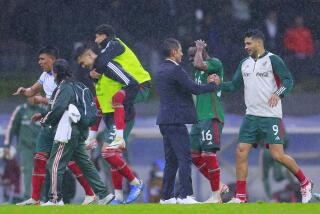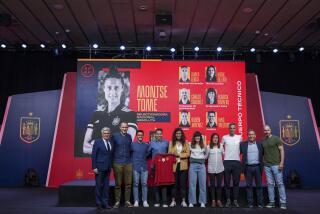Time Catches Up With Cuba : Baseball: Atlanta Olympics might be the last hurrah for veteran players and their eight-year unbeaten streak.
- Share via
A baby-faced teen-ager known as “El Nino” and a free-spirited slugger they called “El Loco” were in the lineup the last time the Cuban national team lost a baseball game that counted.
Three Presidents have since occupied the White House. “El Nino--the Kid” has become a 27-year-old veteran good enough to make pro scouts drool and “the Crazy One” has become better known for his wild antics than his once-formidable talents.
For the last decade, third baseman Omar Linares and outfielder Victor Mesa have formed the core of the dominant amateur team in baseball history. The Cubans have won 125 consecutive games in international tournament play since losing to the United States in the opening round of the 1987 Pan American Games.
By winning the Americas Baseball Challenge in Edmonton earlier this month, they qualified to defend their Olympic title next summer in Atlanta, probably as the favorite.
“This team will be ready for Atlanta,” Miguel Valdes, director of the Cuban baseball program, boasted earlier this year. “I’m predicting we will win.”
And considering Cuba’s record, who can argue with him? But win or lose, the Atlanta Games figure to be the last tournament together for many of Cuba’s stars. And it could mark the end of the Cuban dynasty as well, since many of the team’s aging stars will be retiring and few young players appear ready to take their place. Defections have skimmed some of Cuba’s top prospects and of those who remain, few have international experience.
The decline might already have begun. Earlier this summer, Team USA swept a four-game exhibition series from Cuba. And in its second game in Edmonton, Cuba trailed Nicaragua, 8-1, after six innings, before rallying for an 11-10 victory that kept its streak alive.
Whereas most national teams change from year to year, Cuba’s has been together longer than many marriages. Eight players have been with the team at least 11 seasons and, of the regulars, only center fielder Jose Estrada has been with the team less than nine years.
Now, however, that strength is becoming a weakness as age begins to take a toll. Mesa, who will be 36 when the Atlanta Games open, was once a feared power-hitter and baserunner who could play the outfield with flair. But in last summer’s world amateur championships in Managua, Nicaragua, he was never a factor, batting .238 in 10 games with no home runs and only four runs batted in.
Five other key players--designated hitter Lourdes Gurriel, 38; infielders Antonio Pacheco and Orestes Kindelan, both 31; outfielder Ermidelio Urrutia, 32; and pitching ace Lazaro Valle, 32;--will be a decade or more older than many of the players they will face in the Olympics.
Meanwhile, some of those who haven’t been slowed by age have been lost through defection. Osvaldo Fernandez last month became the fourth pitcher to defect in as many years. Two of the other three--Rene Arocha and Ariel Prieto--are already in the major leagues.
The defection of Fernandez, 28, who pitched in Cuba’s semifinal victory in Barcelona, leaves the once-deep Cuban pitching staff perilously thin.
Fernandez was reportedly inspired to defect after learning that Prieto received a million-dollar signing bonus from the Oakland Athletics in June, only two months after turning up in the United States. Because Prieto, 28, was not considered a front-line pitcher on the island--he was 59-55 with a 4.77 earned-run average in Cuban league play through 1994--Fernandez figured he could demand a much larger reward.
Others have been offered similar enticements. Published reports say that Linares, elected a deputy in Cuba’s National Assembly and long a vocal supporter of the Castro government, has turned down at least two multimillion-dollar offers to defect and sign with major league clubs. In the wake of the Prieto and Fernandez defections, however, he’s certain to be approached again.
And then there is Japan. Nine Cubans, among them ’92 Olympians Jorge Luis Valdes and Jose Delgado, are playing there, and four others are in Italy, all playing under contracts arranged by Cubandeportes SA, an arm of the Cuban sports ministry.
Such contracts earned more than $5 million for the Cuban government last year, helping to keep the sports program afloat during the worst economic crisis in the island nation’s history. Another Olympic title could make some of Cuba’s aging stars even more marketable next year, which could hasten the dismantling of the national team.
“It’s very possible there will be a lot of changes after Atlanta,” Hector Rodriguez, a Cuban television commentator, said. “There are a lot of players older than 30 . . . and there is a group of young players that are going to get better. There are a lot of youngsters ready to play.”
Expecting youngsters to take the place of veterans without missing a beat may be asking too much, however. Stung by the defection of two of its top players en route to last year’s World Junior Championships in Canada, the Cuban team lost five of nine games--finishing behind Brazil and Canada, among others--and failed to place a player on the all-tournament team.
The Cubans did no better this year, dropping four of seven games in early August. So, after having won world junior titles in 1992 and ‘93, Cuba has failed to advance beyond pool play the last two years.
In a sense, the defections were as much a criticism of the island’s baseball program as they were a commentary on Cuba’s political system.
“I want to play with the best in the world,” Alexis Cabreja, now a minor league outfielder, said shortly after he slipped away in Merida, Mexico, in 1992.
Cabreja played six seasons in Cuba’s “Serie Selectiva,” an elite four-team series that annually follows Cuba’s national tournament and features four regional squads made up of the island’s top players. The only higher level of competition available to Cubans is international play, but spots on the national team open infrequently. Only six players on this year’s national team, for example, were not on the team four years ago.
As a result many players good enough to play for Cuba’s national team remain stranded on the island. In fact, Jorge Fuentes, the veteran manager of the national team, has suggested his biggest challenge as Cuba’s manager is cutting his roster to 20 players.
“Young players in Cuba have few games, very few encounters against other teams,” TV commentator Rodriguez said. “Because they are students, it’s difficult for them [to find] opportunities to play against other similar teams. The logical way to improve is to play, to play against other countries.
“But they do very little of that. For that reason, there is a big difference between the junior teams and the national team.”
But, says Gus Dominguez, a Cuban emigre and former college baseball player who now advises virtually every defector, “There’s a lot of talent past what they called the ‘A team.’ They have a knack for injecting new blood into the national. They have always been good at doing that.
“I think [the Cubans] will be good for years to come.”
More to Read
Go beyond the scoreboard
Get the latest on L.A.'s teams in the daily Sports Report newsletter.
You may occasionally receive promotional content from the Los Angeles Times.







